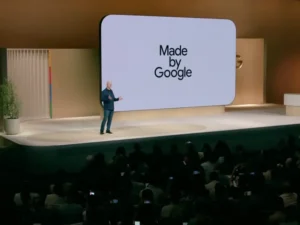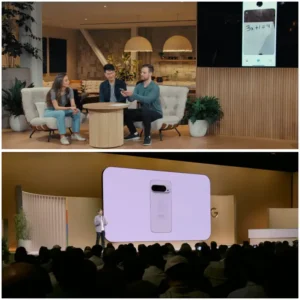At Google’s recent Pixel event, something happened that sent a thrill through my tech-loving soul: they actually demoed new AI features live, on stage, in front of a real audience.
In an era where most product launches feel more like polished infomercials than genuine reveals, Google’s decision to go live was both brave and refreshing—especially when dealing with the unpredictable nature of generative AI. It was a bold move that felt like a breath of fresh air in a tech world dominated by overly scripted presentations.
Of course, it wasn’t all smooth sailing. One of the first demos hit a snag, leaving the presenter awkwardly appealing to the “demo spirits” for help. Another demo, meant to showcase AI-generated images, produced an orange blob that the presenter humorously described as “a little abstract.”

But despite these hiccups, several other demonstrations of Google’s Gemini AI went off without a hitch. And that’s the point—AI is unpredictable, and Google wasn’t afraid to embrace that reality. By repeatedly reminding the audience that this was happening live, Google acknowledged the imperfections that come with cutting-edge technology. In an age where so much content is artificially generated, a little authenticity goes a long way.
For too long, tech companies have hyped up AI as if it were some kind of magic. But when the reality doesn’t quite match the sales pitch, it can feel like we’re being sold snake oil. It’s time for more honesty in how we talk about AI, or customers will quickly grow frustrated with unmet expectations.
Looking ahead to September, all eyes will be on Apple as they prepare to unveil the next iPhones and their own AI initiative, dubbed Apple Intelligence. But the pressure is on—Google and Samsung have already flaunted their best smartphone AI tricks this year. (Usually, Google’s Pixel event comes after Apple’s iPhone reveal, but this time the tables have turned.)

Apple will need to do more than just show off another shiny new iPhone. They’ll have to convince us that upgrading to the iPhone 16 is worth it, especially since many of the features Google showcased with the Pixel devices are already out in the wild.
As an iPhone user, I couldn’t help but feel a twinge of envy. The Pixel’s advanced panorama night photos? Yes, please. The ability to put incoming calls on hold directly from the Pixel Watch? I’d love that on my Apple Watch. And imagine if the Apple Watch could, like the Pixel, automatically contact emergency services if your heart stops beating. Now that’s a feature I could get behind.
In the ever-evolving smartphone battle, copying is part of the game. Google frequently takes cues from Apple, too. Case in point: this week, Google introduced Satellite SOS, a feature strikingly similar to Apple’s Emergency SOS, designed to get help when you’re out of cellular range.
With a little patience, it seems like every phone eventually gets the same features. But the journey to get there? That’s where things get interesting.